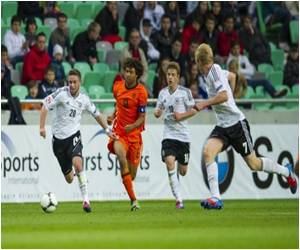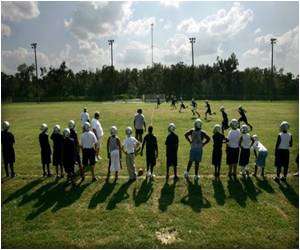Even in the absence of a concussion, blows to the head during a single season of football or ice hockey may affect the brain's white matter and cognition, or memory and thinking abilities, suggests a new research.

"We found differences in the white matter of the brain in these college contact sport athletes compared to non-contact sport varsity athletes," said study author Thomas W. McAllister, MD, of Indiana University School of Medicine in Indianapolis. "The degree of white matter change in the contact sport athletes was greater in those who performed more poorly than expected on tests of memory and learning, suggesting a possible link in some athletes between how hard/often they are hit, white matter changes, and cognition, or memory and thinking abilities."
The work was completed while McAllister was with the Geisel School of Medicine at Dartmouth in Hanover, NH.
The study involved 80 concussion-free Division I NCAA Dartmouth College varsity football and ice hockey players who wore helmets that recorded the acceleration-time of the head following impact. They were compared to 79 non-contact sport athletes in activities such as track, crew and Nordic skiing. The players were assessed before and shortly after the season with brain scans and learning and memory tests.
The study found that a subgroup of both types of athletes performed worse than predicted on a test of verbal learning and memory at the end of the season. A total of 20 percent of the contact players and 11 percent of the non-contact athletes scored more than 1.5 standard deviations below the predicted score. McAllister said a decline this large would have been expected in less than seven percent of a normal population. This subgroup showed more change in the corpus callosum region of the brain than the athletes who scored as predicted on the test. The corpus callosum is a bundle of nerves that connects the right and left sides of the brain.
"This group of athletes with different susceptibility to repetitive head impacts raises the question of what underlying factors might account for the changes in learning and memory, and whether those effects are long-term or short-lived," said McAllister.
Advertisement
To learn more about concussion, please visit www.aan.com/concussion.
Advertisement
Source-Newswise









